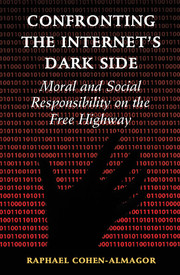Book contents
- Frontmatter
- Dedication
- Contents
- Acknowledgments
- List of Abbreviations
- Introduction
- 1 Historical Framework
- 2 Technological Framework
- 3 Theoretical Framework
- 4 Agent's Responsibility
- 5 Readers' Responsibility
- 6 Responsibility of Internet Service Providers and Web-Hosting Services, Part I: Rationale and Principles
- 7 Responsibility of Internet Service Providers and Web-Hosting Services, Part II: Applications
- 8 State Responsibility
- 9 International Responsibility
- Conclusion
- Glossary
- Selected Bibliography
- Index
5 - Readers' Responsibility
Published online by Cambridge University Press: 05 July 2015
- Frontmatter
- Dedication
- Contents
- Acknowledgments
- List of Abbreviations
- Introduction
- 1 Historical Framework
- 2 Technological Framework
- 3 Theoretical Framework
- 4 Agent's Responsibility
- 5 Readers' Responsibility
- 6 Responsibility of Internet Service Providers and Web-Hosting Services, Part I: Rationale and Principles
- 7 Responsibility of Internet Service Providers and Web-Hosting Services, Part II: Applications
- 8 State Responsibility
- 9 International Responsibility
- Conclusion
- Glossary
- Selected Bibliography
- Index
Summary
A person who is only concerned with himself, will wake up one morning and question his worth. A person who gives his time and effort to others will know his worth when he sees the fruits of his labour.
–Yoni Jesner
As use of the Internet has become widespread, it has enabled global daily communication, served as a new central public space, and provided a point of free access to a multiplicity of information sources. Those who express themselves over the Internet enjoy nearly unrestricted freedom, obtained mainly as the result of the Web's architecture. As explained in chapter 2, dissemination of information is far reaching, global, cheap, and fast.
The Internet can be used for positive purposes as well as for negative and wicked purposes. The Web is replete with detailed, accurate manuals designed to teach the average person how to harm others, assemble weapons and explosives, and commit crime. New technologies are facilitating traditional criminal activities and creating avenues for new and unprecedented forms of deviance. On the Internet, people exchange fantasies of how they would like to violently rape and murder young girls. On a webpage called “Place of Dark Desires,” people can watch rape videos, some of which show the raping of preteen girls. People post instructions for producing weapons and bombs and for committing acts of violence, such as how to become a successful hitman, how to build practical firearm silencers, and how to carry out car bomb attacks. Although some people may celebrate this openness as a democratizing, publicly empowering characteristic of the Internet that promotes intellectual and social progress, the hazards of such websites should not be ignored.
One way to confront the dangers of boundless speech on the Web is by focusing on how people should react on encountering antisocial speech. My aim is to promote reader responsibility. This chapter begins with the story of Kimveer Gill, a 25-year-old man from Laval, Montreal, who carried out his intention to murder young students at Dawson College.
- Type
- Chapter
- Information
- Confronting the Internet's Dark SideMoral and Social Responsibility on the Free Highway, pp. 115 - 146Publisher: Cambridge University PressPrint publication year: 2015



